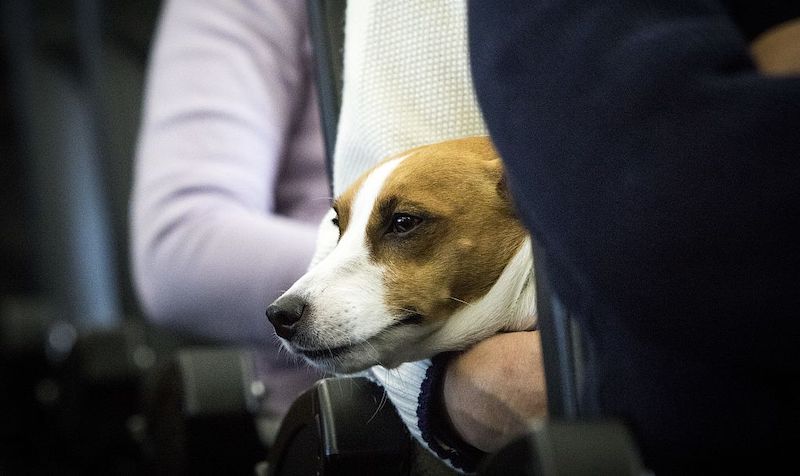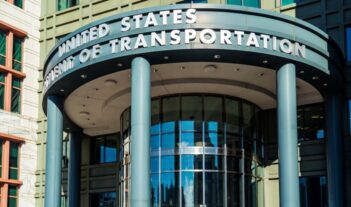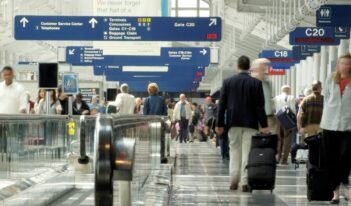
A federal rule finalized under the Trump Administration allows airlines to narrow the use of animals as a disability accommodation on flights.
After surviving a head trauma while working as a U.S. Air Force photographer, Stacy Pearsall developed anxiety and seizures. As part of her treatment, Pearsall began working with a specially trained two-year-old dog named Charlie. Among other things, Charlie alerts Pearsall to people approaching so that Pearsall does not startle—a response that she calls “a leftover reflex from war.”
Pearsall is one of a growing number of people in the United States who use assistance animals—including dogs, cats, birds, and others—to manage mobility limitations, blindness, depression, allergies, and other disabilities. Despite the benefits of assistance animals, recent changes in the law have tended to limit the rights of people who use them. Now, a U.S. Department of Transportation rule finalized in December could reduce access to assistance animals on airplanes.
The new rule amends the Transportation Department’s regulations under the Air Carrier Access Act, a law that prohibits discrimination in airline services on the basis of disability. The Air Carrier Access Act requires airlines to provide “reasonable accommodations” for passengers who need the assistance of an animal during flights. With some exceptions, airlines must allow these animals to travel in the cabin with their handler, and they cannot charge special fees to carry them on board.
The rule makes three key changes to the agency’s regulations.
First, the Transportation Department narrows the definition of “service animals”—assistance animals that may be protected on flights as a disability accommodation—to include only dogs individually trained to do work or perform tasks for a person with a disability. The rule also permits airlines to protect only those service animals that fit on their handler’s lap or in their foot space. Previously, the Department did not limit the definition of service animal to a particular species or size of animal.
To justify this change, the agency implies that dogs—but not other animals—have the “temperament and ability” to “behave appropriately” in public settings when surrounded by many people. The need for a blanket species prohibition seems unclear, however, given that the rule also requires handlers to attest that their service animal is “properly trained to behave in public.”
The Transportation Department also defends the species prohibition on the basis that dogs are the most common type of assistance animal brought on flights—a justification plainly out of step with the legal requirement that disability accommodations be individualized.
Second, the rule strips protections for people with assistance animals that provide companionship and emotional support. Previously, the agency classified emotional support animals as a type of service animal to be protected under disability discrimination law. The new rule, however, will permit airlines to treat emotional support animals as they would any pet. Specifically, airlines will be free to charge fees to carry emotional support animals, to carry them in stowage rather than in passenger areas, and to deny them passage altogether.
The Transportation Department justifies this change by asserting that it will “reduce confusion among airlines, passengers, airports, and other stakeholders.” Other modes of transportation require accommodations only for service animals and not emotional support animals. In making this argument, however, the agency seems to discount the fact that airlines and people with disabilities can learn more than one rule pertaining to their rights and obligations.
The Department also defends the removal of emotional support animals from the service animal designation based on public comments. A number of airlines wrote comments alleging incidents of animal misbehavior, including serious injuries to passengers and crew. Commenters also claimed that passengers sometimes pass off ordinary pets as emotional support animals to avoid airline handling fees.
An increase in fraudulent claims outside the flight context has led at least one state to criminalize these types of claims, but the Transportation Department does not present actual data apart from comments from airlines and similarly aligned stakeholders to support its concerns. In seeking to deter animal misbehavior and false claims, it appears that the Department did not consider the full range of alternatives to treating emotional assistance animals as pets, such as imposing fines for fraudulent claims.
Finally, to the benefit of people with mental disabilities, the new rule eliminates distinctions between the treatment of psychiatric and non-psychiatric service animals. Previously, the agency had allowed airlines to draw a distinction between service animals for people with physical impairments on the one hand and people with psychiatric disabilities on the other. Because of concerns that passengers might falsely claim to have a psychiatric service animal to avoid extra fees when flying with a pet, airlines could require medical documentation from passengers purporting to travel with a psychiatric service animal and impose heightened check-in requirements on them.
Acknowledging that passengers could also falsify a physical disability requiring the use of a service animal, the Transportation Department now prohibits airlines from imposing extra burdens on handlers with psychiatric disabilities. Similarly, the rule also reverses the agency’s prior policy of allowing airlines to require people traveling with a service animal to check in physically at the airport even when the general public could check in online.
Despite this apparent win for people with mental disabilities, Prairie Conlon, an administrator at an animal-assisted therapy organization, reportedly argued that the rule overall still smacks of “textbook discrimination” against people with psychiatric disabilities. People with mental rather than physical disabilities are more likely to use emotional support animals than service animals.
Time will tell whether airlines water down their accommodations policies to the full extent of the Transportation Department’s new rule—an outcome that seems likely given the industry’s overwhelming support of the new rule amid fraud and safety concerns related to emotional support animals. To mitigate potential changes to airline policies, people who plan on flying with an emotional support dog might wish to consider whether their dog could be trained as a service animal.



